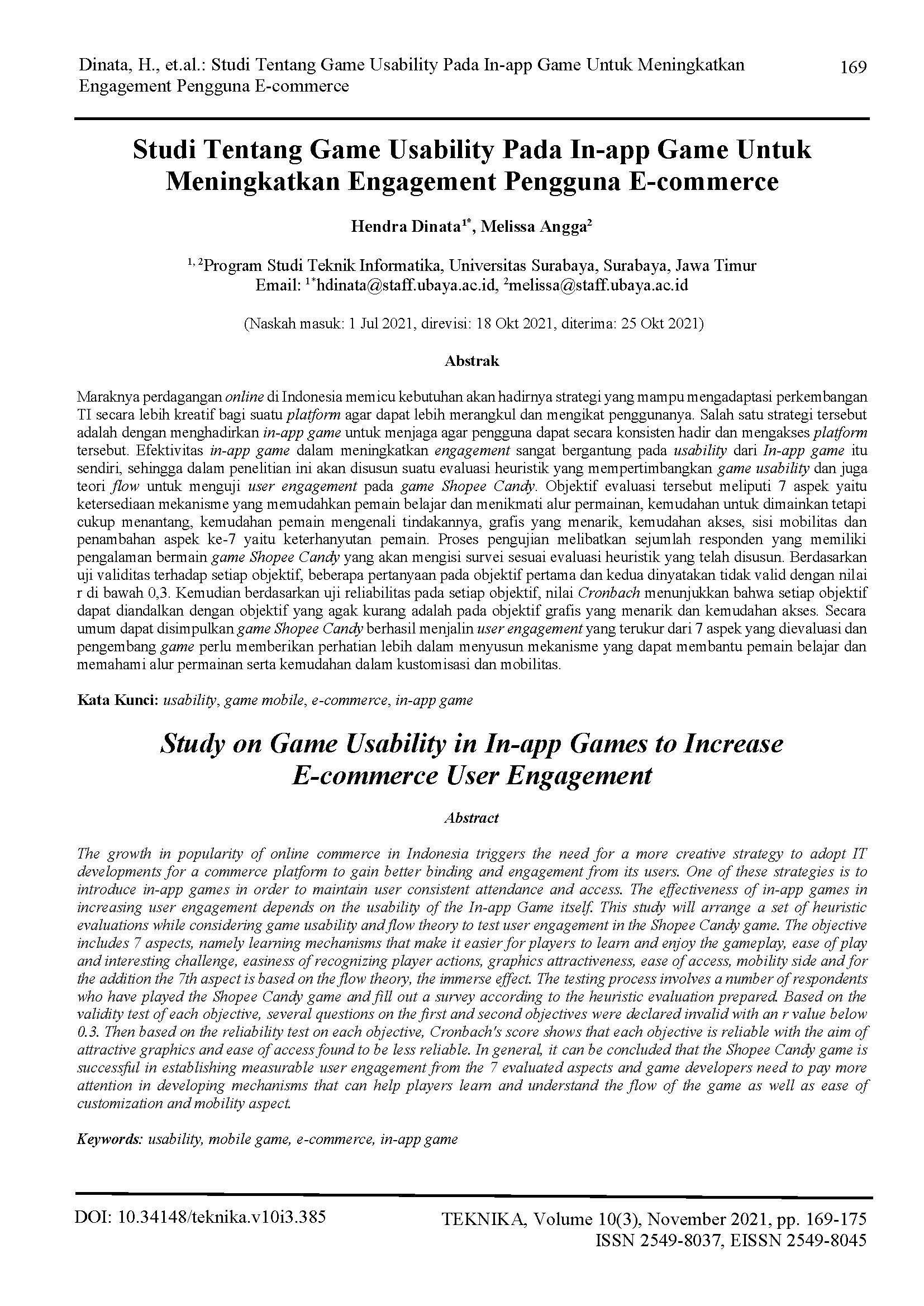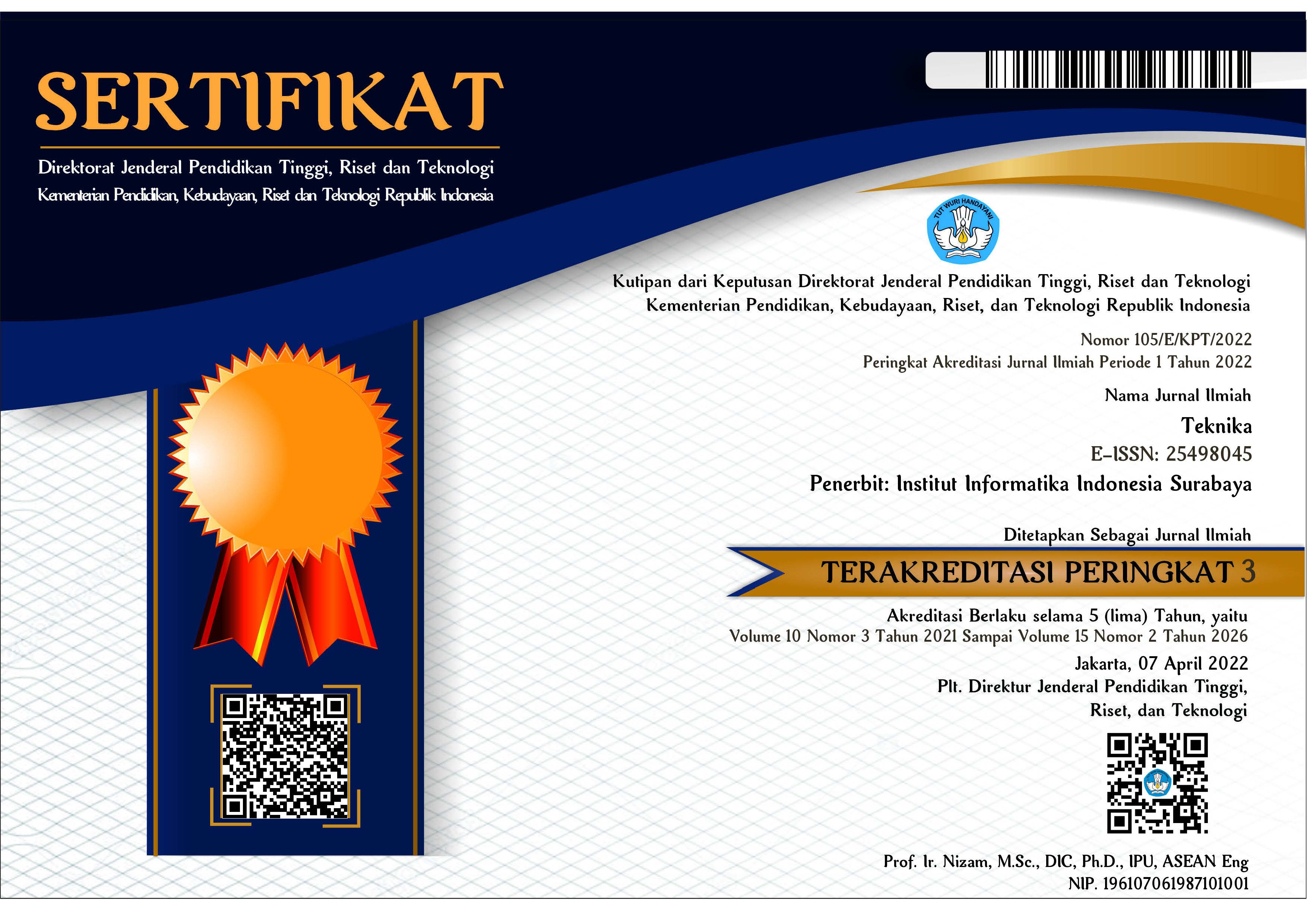Studi Tentang Game Usability Pada In-app Game Untuk Meningkatkan Engagement Pengguna E-commerce
DOI:
https://doi.org/10.34148/teknika.v10i3.385Keywords:
usability, game mobile, e-commerce, in-app gameAbstract
Maraknya perdagangan online di Indonesia memicu kebutuhan akan hadirnya strategi yang mampu mengadaptasi perkembangan TI secara lebih kreatif bagi suatu platform agar dapat lebih merangkul dan mengikat penggunanya. Salah satu strategi tersebut adalah dengan menghadirkan in-app game untuk menjaga agar pengguna dapat secara konsisten hadir dan mengakses platform tersebut. Efektivitas in-app game dalam meningkatkan engagement sangat bergantung pada usability dari In-app game itu sendiri, sehingga dalam penelitian ini akan disusun suatu evaluasi heuristik yang mempertimbangkan game usability dan juga teori flow untuk menguji user engagement pada game Shopee Candy. Objektif evaluasi tersebut meliputi 7 aspek yaitu ketersediaan mekanisme yang memudahkan pemain belajar dan menikmati alur permainan, kemudahan untuk dimainkan tetapi cukup menantang, kemudahan pemain mengenali tindakannya, grafis yang menarik, kemudahan akses, sisi mobilitas dan penambahan aspek ke-7 yaitu keterhanyutan pemain. Proses pengujian melibatkan sejumlah responden yang memiliki pengalaman bermain game Shopee Candy yang akan mengisi survei sesuai evaluasi heuristik yang telah disusun. Berdasarkan uji validitas terhadap setiap objektif, beberapa pertanyaan pada objektif pertama dan kedua dinyatakan tidak valid dengan nilai r di bawah 0,3. Kemudian berdasarkan uji reliabilitas pada setiap objektif, nilai Cronbach menunjukkan bahwa setiap objektif dapat diandalkan dengan objektif yang agak kurang adalah pada objektif grafis yang menarik dan kemudahan akses. Secara umum dapat disimpulkan game Shopee Candy berhasil menjalin user engagement yang terukur dari 7 aspek yang dievaluasi dan pengembang game perlu memberikan perhatian lebih dalam menyusun mekanisme yang dapat membantu pemain belajar dan memahami alur permainan serta kemudahan dalam kustomisasi dan mobilitas.
Downloads
References
Redseer. (2020). Indonesia E-commerce: Racing Ahead. [Online]. Diakses dari: https://redseer.com/newsletters/indonesia-e-commerce-racing-ahead/ pada tanggal 16 Maret 2021
Iprice. (2021). The Map of E-commerce in Indonesia [Online]. Diakses dari: https://iprice.co.id/insights/mapofecommerce/en/pada tanggal 16 Mar 2021
MacGregor, R.C. & Vrazalic, L. (2005). Role of Small-Business Strategic Alliances in the Perception of Benefits and Disadvantages of E-commerce Adoption in SME. London: Idea Group publishing
Lee, Y.E. & Benbasat, I. (2004). A Framework for the Study of Customer interface Design for Mobile Commerce. International Journal of Electronics and Communications, Vol. 8(3), pp. 79-102
Lu, H.K., Lin, P.C. & Lin, Y.C. (2016). A Study of the Factors Affecting the Purchase Intention on Mobile Game Apps. Journal of Advances in Information Technology, Vol. 7(4), pp. 239-244
Sonnenberg, C. (2020). Mobile Media Usability: Evaluation of Methods for Adaptation and User Engagement. Journal of Media Management and Entrepreneurship, Vol. 2(1), pp. 86 - 107
Nielsen, J. & Budiu, R. (2013). Mobile Usability. New Riders, Berkeley, CA, United States of America
Salo, J. (2010). Conceptualizing Mobile Game Advertising: Relationship between Different Game Types and Degree of Brand Exposure. Journal of Digital Marketing, Vol. 1, pp. 129-138
Karat, C.M. (2005). A Business Case Approach to Usability Cost Justification for the Web. Cost-Justifying Usability: An Update for an Internet Age, pp. 103—141. https://doi.org/10.1016/B978-012095811-5/50004-3
Nielsen, J. (1994). Enhancing the Explanatory Power of Usability Heuristics. Proceedings of the SIGCHI Conference on Human Factors in Computing Systems. pp. 152—158. https://doi.org/10.1145/191666.191729
Federoff, M.A. (2002). Heuristics And Usability Guidelines For The Creation And Evaluation Of Fun In Video Games. Indiana University
Desurvire, H., Caplan, M. & Toth, J.A. (2004). Using Heuristics to Evaluate the Playability of Games. Proceedings CHI 2004 Extended Abstracts on Human Factors in Computing Systems, pp. 1509—1512. https://doi.org/10.1145/985921.986102
Pinelle, D., Street, U. & Hall, G. (2008). Heuristic Evaluation for Games: Usability Principles for Video Game Design. Proceedings of the SIGCHI Conference on Human Factors in Computing Systems, pp. 1453—1462
Pinelle, D., Wong, N., Stach, T., Gutwin, C., Street, U., & Hall, G. (2009). Usability Heuristics for Networked Multiplayer Games. Proceedings of the ACM 2009 International Conference, pp. 169—178
Hochleitner, C., Hochleitner, W., Graf, C. & Tscheligi, M. (2015). A Heuristic Framework for Evaluating User Experience in Games. Game User Experience Evaluation, 1st Ed. Springer.
Korhonen, H. & Koivisto, E. M. I. (2006). Playability Heuristics for Mobile Multi-player Games. Proceedings of the 8th Conference on Human-Computer Interaction with Mobile Devices and Services. https://doi.org/10.1145/1306813.1306828
Alhaidary, R. & Altammami, S. (2017). Can the Success of Mobile Games Be Attributed to Following Mobile Game Heuristics?, In: Meiselwitz G. (eds) Social Computing and Social Media. Human Behavior. SCSM 2017. Lecture Notes in Computer Science, vol 10282. Springer, Cham. https://doi.org/10.1007/978-3-319-58559-8_2
Desurvire, H. & Wiberg, C. (2009). Game Usability Heuristics (PLAY) for Evaluating and Designing Better Games: The Next Iteration. In: Ozok A.A., Zaphiris P. (eds) Online Communities and Social Computing. OCSC 2009. Lecture Notes in Computer Science, vol 5621. Springer, Berlin, Heidelberg. https://doi.org/10.1007/978-3-642-02774-1_60
Mylly, S., Rajanen, M. & Iivari, N. (2019). Usable Usability Heuristics for Game Developers. In A. Siarheyeva, C. Barry, M. Lang, H. Linger, & C. Schneider (Eds.), Information Systems Development: Information Systems Beyond 2020 (ISD2019 Proceedings). Toulon, France: ISEN Yncréa Méditerranée.
Johnson, D. & Scholes, L. (2013). Videogames and wellbeing: A comprehensive review, Young and Well CRC, Melbourne, VIC, Australia
Yuksel, M. (2012). The Positive Psychology of Gaming: Immersion Through Flow in Simulations. Journal of Internet and e-Business Studies, pp. 1-10
Chiang, Y.T., Lin, S.J., Cheng, C.Y. & Liu, E.Z. (2011). Exploring Online Game Players' Flow Experience and Positive Affect. The Turkish Online Journal of Educational Technology, Vol. 10(1), pp. 106-114
Voiskounsky, A.E. (2010). Internet Addiction in the Context of Positive Psychology. Psychology in Russia State of Art, 3, pp. 541-549
Chou, J.C., Hung, C. & Hung, Y. (2014). Design Factors of Mobile Game for Increasing Gamer’s Flow Experience. Proceedings of 2014 IEEE International Conference on Management of Innovation and Technology. doi:10.1109/icmit.2014.6942414
Kaltum, U., Rimadina, R. & Zusnita, W. (2018). The Technology Acceptance Model for Playing Mobile Games in Indonesia. Proceedings of The 2018 International Conference of Organizational Innovation, pp. 1022 - 1034
Andersen, E., O’Rourke, E., Liu, Y.E., Snider, R., Lowdermilk, J., Truong, D., Cooper, S. & Popovic, Z. (2012). The Impact of Tutorials on Games of Varying Complexity. Proceedings of CHI 2012. Austin, Texas, USA
Huang L.Y. & Hsieh, Y.J. (2011). Predicting Online Game Loyalty Based on Need Gratification and Experiential Motives. Internet Research, Vol. 21(5), pp. 581-598
Kristanto, D. (2018). The Impact of Game Avatar CUstomization in Improving User Experience and Gamer Loyalty. The International Journal of Applied Business, Vol. 2(2).
Bycer, J. (2014). The Importance of Progression Gameplay Models. Diakses dari https://game-wisdom.com/critical/progression-gameplay pada tanggal 20 Juni 2021























